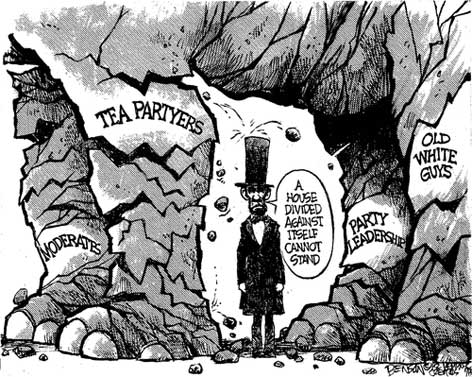By Rob Oldham
Who exactly is in charge of the Republican Party?
Not John Boehner. The Speaker of the House announced his resignation after the House Freedom Caucus, a group of about 40 hardline conservatives, threatened to overthrow him for advancing a government funding bill that included Planned Parenthood. Despite his popularity within the caucus, Boehner was unable to reconcile the goals of conservatives with the necessities of responsible governing.
Not Kevin McCarthy either. The House Majority Leader, widely seen as Boehner’s heir, withdrew his bid for Speaker after the Freedom Caucus indicated they would not support him. McCarthy, along with former Majority Leader Eric Cantor, led the “Young Gun” movement in 2010 that promised to usher in a new era of strong conservative leaders. Just four years later, Cantor has lost his seat to a radical primary challenger and McCarthy’s Speakership has been blocked by the very conservatives he helped deliver a House majority for in 2010.
The Freedom Caucus? Even though they took down Boehner and McCarthy, conservatives cannot find a candidate of their own for Speaker. Their membership is large enough to impede the 247 member Republican Caucus from obtaining 218 votes to pass bills, but it is too small to assert any real power over the House agenda.
The GOP House majority is functioning more like a parliamentary system than a two-party assembly right now. The majority is essentially a coalition, split between establishment Republicans and conservatives. Establishment Republicans are more moderate and work across the aisle to pass necessary legislation like funding the government. The conservatives, led by the Freedom Caucus, oppose nearly all compromise as they push their agenda of shrinking the size of government.
Conservatives have not been afraid to use their influence to wreak havoc on the establishment Republicans. The first sign of trouble was when 25 members of the House voted against Boehner as Speaker last January. It only got worse from there. In July, Rep. Mark Meadows (R-NC), a Freedom Caucus member, introduced a motion to vacate the chair, effectively a conservative coup against Boehner. After the aforementioned fight over Planned Parenthood, Boehner had had enough of the hardline conservative faction. Shortly after announcing his resignation, Boehner derided the faction as “false prophets,” who make unreasonable demands to advance their own careers rather than acting prudently to advance the GOP’s long game of recapturing all three branches of government.
The Freedom Caucus will reveal how unreasonable they really are as two important fiscal deadlines approach. Boehner fell on his sword to preserve the legitimacy of the House, but he only funded the government for two more months. Not only will there need to be a bill funding the government past Dec. 11, but also an increase in the debt ceiling, which, if breached, could trigger a worldwide economic meltdown.
If history is a reliable guide, these will both be difficult fights. Since Republicans won the House in 2010, conservatives have been un-afraid to use extreme measures to achieve fiscal austerity. In 2011, 2012, and 2013 conservatives brought the country to the brink of economic disaster to try and force spending cuts. Each time, they threatened to allow the debt ceiling to expire unless their demands were met. And many conservatives weren’t bluffing. As Republican Senate Leader Mitch McConnell put it, “Some of our members may have thought the default issue was a hostage you might take a chance at shooting.”
Before he resigns, Boehner has expressed interest in “clearing the barn,” by shepherding the debt ceiling extension and a government funding bill through Congress with a moderate Republican-Democrat coalition. But that was before conservatives derailed McCarthy’s Speakership. Although Boehner may still be able to push his agenda through before he resigns on Oct. 30, any attempt to bypass the conservatives will burden the next Speaker, who will need the blessing of the Freedom Caucus to get 218 votes on the floor. They are unlikely to support a Speaker who works with Boehner and the establishment to keep the government functioning.
However, the Freedom Caucus does not want a conservative litmus test for the next Speaker. Although it wouldn’t hurt for the next contender to be a strong conservative, the Freedom Caucus stresses that their concerns are not ideological. Freedom Caucus member Justin Amash (R-MI) says that Boehner wrecked the House not by his policy, but by refusing to recognize regular order. Regular order means that the House should work like it does in a textbook. Bills should be introduced to the whole body, referred to committees, and be open to amendment. In reality, important bills are usually negotiated by party leaders without input from the members who eventually vote on it. Boehner’s bills to fund the government and raise the debt ceiling would surely be outside of regular order.
It is doubtful that regular order would work in a dysfunctional Congress that has a tendency to govern in crisis mode. With the stakes as high as a government shutdown or a debt default, House leaders need to able to write compromise bills that could pass the Senate and be signed by the president without worrying about the concerns of individual members. Compromise bills are more efficient than regular order bills, and they are more likely to be passed before a crucial fiscal deadline comes up.
Regardless of the merits of regular order, one can sympathize with the Freedom Caucus’s complaints. They were elected to represent their constituents’ interests on important matters, not be “corralled” to vote for a bill through the establishment’s “fear and intimidation,” as Amash says. Although they did the best they could to manage a divisive caucus while still advancing the Republican agenda, John Boehner and his establishment allies represent a lot of what voters hate about Washington. They promote a “pay to play” system where members are rewarded for fundraising prowess instead of policy skills. They punish non-compliant conservatives by withholding committee assignments. Although money and party loyalty are necessary evils in modern politics, the establishment has not expressed interest in reforming either. Conservative anger is understandable, even justified.
If the Freedom Caucus is genuinely concerned with restoring regular order and not advancing an extreme agenda, then the establishment should listen to their concerns. The rise of Donald Trump, Ben Carson, and Carly Fiorina in the Republican Presidential Primary is a wakeup call for the establishment that voters are more interested in outsiders than the Washington political class for leadership.
The Freedom Caucus should change its tactics though. There is never a reason to play chicken with the country’s financial integrity. Conservatives who advocate fiscal brinksmanship as means to topple the Washington establishment risk becoming the “false prophets” that Boehner warned of. But don’t dismiss the merits of the Freedom Caucus platform because of their misguided tactics. If the establishment wants to reassert control over the House, then it needs to consider reasonable conservatives demands like reforming fundraising and committee assignments, and maybe even restoring regular order for certain bills without deadlines.
At the moment there is no one in charge of the Republican Party. The establishment and the conservatives are not just divided on ideology, but on the basics of managing a majority caucus. However, the night is always darkest before the dawn. The divided GOP is primed for new leadership who will listen to the both factions and lead the party away from its dangerous flirtation with dysfunction. If the Republican Party can manage that, then it might forestall a future battle with disaster and, eventually, irrelevancy.
This article originally appeared in the Fall 2015 edition of the Georgia Political Review magazine. It has been republished here.


